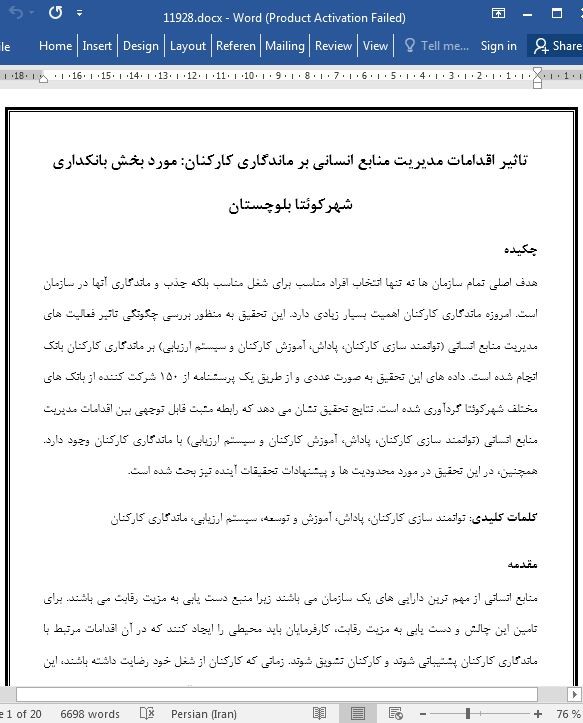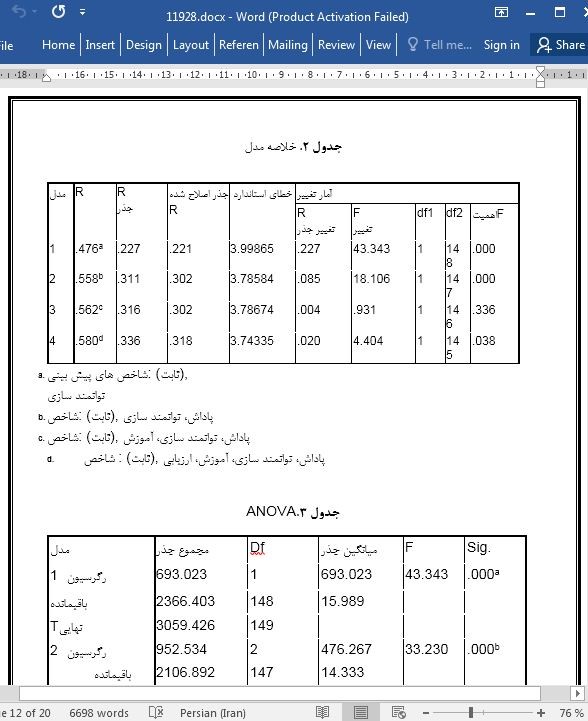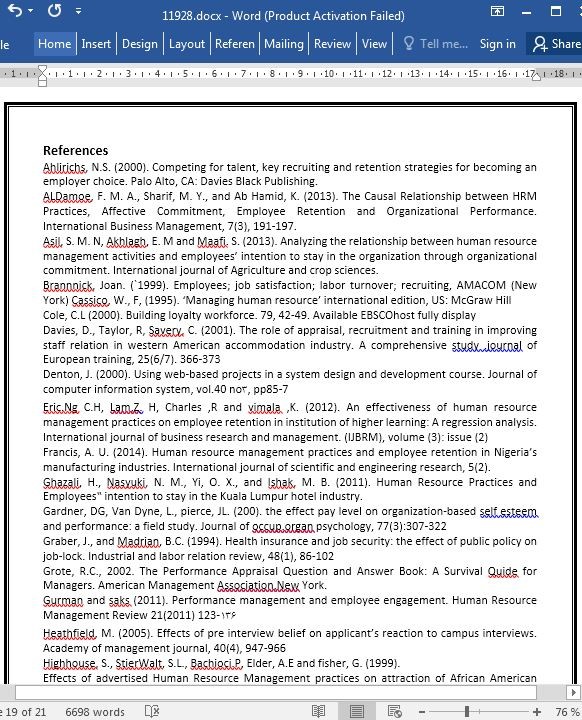
تاثیر اقدامات مدیریت منابع انسانی بر ماندگاری کارکنان
چکیده
هدف اصلی تمام سازمان ها نه تنها انتخاب افراد مناسب برای شغل مناسب بلکه جذب و ماندگاری آنها در سازمان است. امروزه ماندگاری کارکنان اهمیت بسیار زیادی دارد. این تحقیق به منظور بررسی چگونگی تاثیر فعالیت های مدیریت منابع انسانی (توانمند سازی کارکنان، پاداش، آموزش کارکنان و سیستم ارزیابی) بر ماندگاری کارکنان بانک انجام شده است. داده های این تحقیق به صورت عددی و از طریق یک پرسشنامه از 150 شرکت کننده از بانک های مختلف شهرکوئتا گردآوری شده است. نتایج تحقیق نشان می دهد که رابطه مثبت قابل توجهی بین اقدامات مدیریت منابع انسانی (توانمند سازی کارکنان، پاداش، آموزش کارکنان و سیستم ارزیابی) با ماندگاری کارکنان وجود دارد. همچنین، در این تحقیق در مورد محدودیت ها و پیشنهادات تحقیقات آینده نیز بحث شده است.
مقدمه
منابع انسانی از مهم ترین دارایی های یک سازمان می باشند زیرا منبع دست یابی به مزیت رقابت می باشند. برای تامین این چالش و دست یابی به مزیت رقابت، کارفرمایان باید محیطی را ایجاد کنند که در آن اقدامات مرتبط با ماندگاری کارکنان پشتیبانی شوند و کارکنان تشویق شوند. زمانی که کارکنان از شغل خود رضایت داشته باشند، این عامل باعث می شود تا نسبت به کار و سازمان خود تعهد داشته باشند و تمایل آنها برای ماندن در یک سازمان به حداکثر برسد.
ماندگاری کارکنان اشاره به توانایی سازمان برای حفظ و نگه داری کارکنان دارد. تلاشهای انجام شده توسط سازمان در ایجاد محیطی برای حمایت از ماندن کارکنان در سازمان برای دست یابی به این هدف موثر است، از این رو سازمان ها باید سیاست هایی را در پیش بگیرند که هدف آنها تامین نیازهای کارکنان، افزایش رضایت شغلی، تشویق و ایجاد انگیزه در آنها باشد. بنابراین، سازمان ها از کارکنان خود می خواهند تا در قبال کار خود متعهد باشند و در سازمان باقی بمانند. اگرچه بکار گیری نیروی توانا و دارای صلاحیت عامل مهمی است، اما ماندگاری کارکنان یک موضوع چالش برانگیز است.
Abstract
The main objective of almost every organization is not only to select the right person for the right job but also to fascinate and retain them within the organization. Employee retention has considerable importance these days. This research was conducted to investigate how human resource management practices (employee compensation, employee training, appraisal system and employee empowerment) affect retention of banks employees. The data of this study was quantitative collected through questionnaire from 150 respondents from different banks of Quetta city. The results of the current study reveal that there is a significant positive relationship between human recourse management practices (empowerment, compensation, training and appraisal system) with employee retention. The study also discusses the limitations and recommendation for future research.
Introduction
Human resource is the most important asset of any organization as it is the source of achieving competitive advantage. In order to meet this challenge of achieving competitive edge the employers need to create such an environment that support the practices of retention. In which employees are encouraged. Once they are satisfied with their jobs, it will lead them towards commitment to their work as well as the organization and their intention to stay within the organization will be maximized.
Employee retention refers to the ability of the organization to retain its employees. It is the efforts by employers in maintaining such an environment that supports staff to remain within the organization for this purpose organization attempts to make policies that are aimed to meet the needs of the employees, enhance their job satisfaction, encourage and motivate them. Therefore the organizations want their employees to be more committed towards their work, performance and likely to retain in the organization. For any organization although hiring of competent employees is crucial, yet it is more important and challenging to retain those employees.
چکیده
مقدمه
مروری بر ادبیات
ماندگاری کارکنان
پاداش کارکنان
آموزش کارکنان
ارزیابی عملکرد
توانمند سازی کارکنان
متغیرهای تحقیق
فرضیه های تحقیق
چارچوب تئوری
تحلیل همبستگی و رگرسیون در این تحقیق
تحلیل رگرسیون
روش تحقیق
تحلیل داده ها
بحث
نتیجه گیری
محدودیت ها و پیشنهادات تحقیق
منابع
Abstract
Introduction
Literature review
Employee retention
Employee compensation
Employee Training
Performance appraisal
Employee empowerment
Reasearch variables
Hypothesis of the study
Research methodology
Data analysis
Theoritical framework
Correlation and regression analysis of the research
Regression Analysis
Discussion
Conclusion
Limitations and recommendations of the study
References
- اصل مقاله انگلیسی با فرمت ورد (word) با قابلیت ویرایش
- ترجمه فارسی مقاله با فرمت ورد (word) با قابلیت ویرایش، بدون آرم سایت ای ترجمه
- ترجمه فارسی مقاله با فرمت pdf، بدون آرم سایت ای ترجمه



